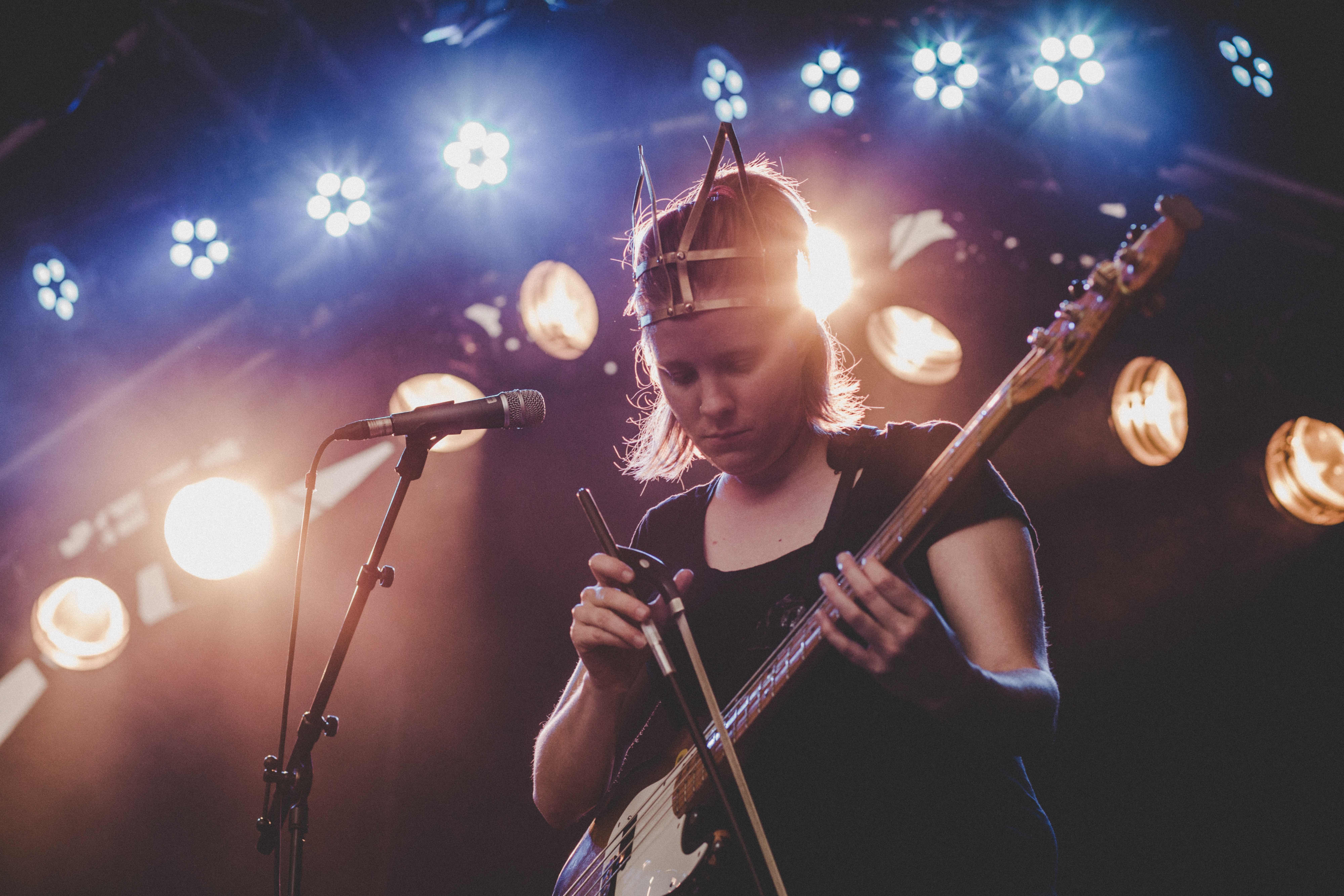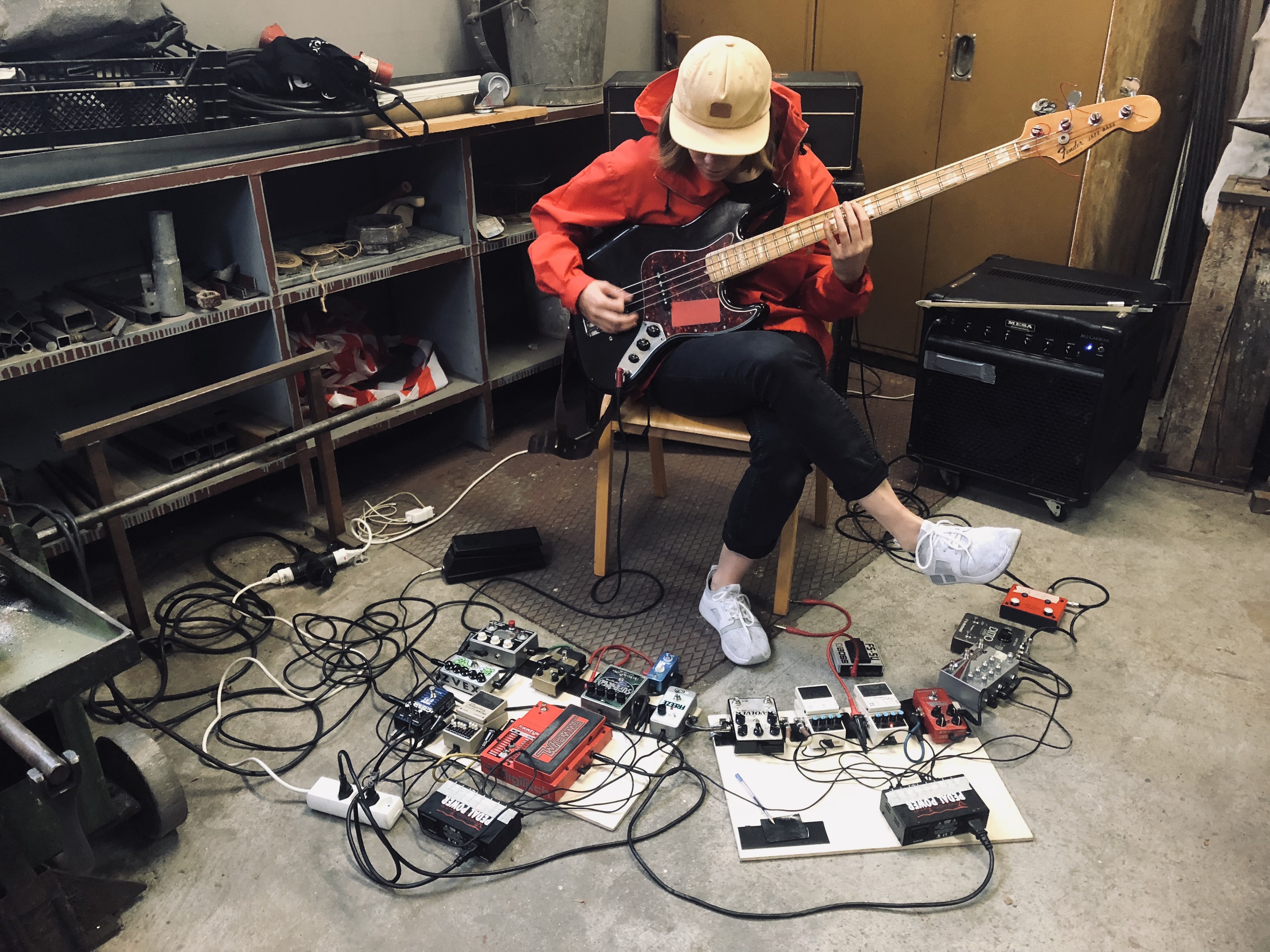Episode 2 of the neoblog portrait series on the Swiss Music Prize 2020:
Martina Berther from Chur – a very typical and at the same time unusual bass player.

Jodok Hess
Martina Berther is a typical electric bass player because she can basically play anything, like many bassists. She’s been grooving hard with hip-hop bands, played feminist punk rock with drummer Beatrice Graf, accompanied great quality pop music with Sophie Hunger or played electro-pop for Daniela Sarda. As Frida Stroom she experiments solo on the bass and moves completely free in the realm of noise.
I met Martina Berther in her rehearsal room in Zurich Affoltern – a nice, big bright space with lots of guitars, basses, effects and drum sets everywhere.
The fact that she shares the room with several other musicians sometimes stresses her out, because it can get crowded. On the other hand, she likes it because it automatically requires a certain discipline and people help each other out.
In general, Martina seems to be someone who if life gives you nothing but lemons, makes some lemonade. The story of how she came to the electric bass in the first place is a beautiful one for example, as the former conductor of the “Jugendmusik Chur” Music School left her take over only reluctantly:
“I used to play trumpet, but it was not really my instrument, fortunately – because that’s how I stayed open-minded and kept looking for what could turn out to become my instrument. In the “Jugendmusik” there was this quite revolutionary electric bass player and bear in mind, the “Jugendmusik” was rather conservative at that time. This electric bassist was over 20 years old, so he had to quit, so they were looking for someone else, but obviously male. When I proposed to take over, the director said: ‘Oh well, we’ll have to have a meeting and discuss if that’s possible, a woman on the bass’.”
Others might have been offended and hence abandoned, but not Martina Berther. She waited patiently for the outcome of that meeting.
“Thanks to an open-minded member of the board, who was female and strongly defended my cause, I was admitted and luckily got to play bass.”
Luckily indeed! After all, this is how the Swiss music scene came to choose an electric bassist among the prizewinners. The Swiss Music Prize is what this interview will focus on.
25000 francs in Corona times, you don’t say no to that, do you?
“No! (laughs) – you don’t say no to that. You don’t say no to that in non-corona times neither.”
Were you surprised?
“Yes, indeed I was! Last year I attended the award ceremony, as my musical partner Beatrice Graf (drummer of Ester Polly) got it and I thought: If I continue to work well, maybe I’ll get it one day. It simply came much earlier… (laughs) But I would have gone on for another 50 years even without prices.
Martina Berther / Beatrice Graf @ Ester Poly – Fieldsession, B-Sides Festival 2018
Your broad profile is therefore not a business plan?
“No, definitely not! It all came about out of curiosity.”
Tell us about your role models?
I inspire myself more to sounds than to musicians. Whenever I heard an intriguing sound, be it a cello or a drum set, I would reflect on what I like about it and what I could translate about it on the bass?
So it’s all about sound?
“Sound, or energy – sometimes it is difficult for me to point out, what exactly I like about a musician. It is often a presence or an attitude, which is what I have tried to adopt as a role model. On the other hand, I quite often hear: I started playing bass because of you. Which is beautiful of course.”
When I listen to the Frida Stroom project, Hermeto Pascoal comes to mind – because of the concept that everything is music. Even his beard is music to him, or a banknote he plucks. So I asked myself: Is it this curiosity that makes them go beyond sound, energy and all that to look for something new?”
“Yes, it is mainly about sound. It can also be things that happen while you play. Sometimes I notice that the whirring of the amp was actually the most beautiful moment of a 30 minutes improvisation, so I focus mainly on that and feel the urge to develop further.”
“the whirring of the amp.. the most beautiful moment of a 30 minutes improvisation”
How do you prevent the listener from feeling excluded?
“Actually, theoretically, it is quite simple. If I myself get involved in the moment, in space, in the audience, by making myself vulnerable and start to play only from that point, the public gets involved very quickly. It becomes more difficult when there’s insecurity and I try not to allow improvisation and decide to start with a particular sound”.
Is that already too much?
“Sometimes it is. Or when I start improvising and then find myself thinking: I could do that next. I then have the feeling of being too busy to really notice what’s actually happening, in the room or with my instrument. Because everything is already there. You can do so much with very little, all you need is the courage to get involved. If I fight against it, out of insecurity, then it is more me fighting against something.
“You just have to find the courage and go for it.”
“all you need is the courage to get involved”
Martina Berther with Frida Stroom, live at Gamut Festival 2017
Is improvisation in this case something like surrendering? Letting go?
“For me it is, yes. Sometimes it works very well, sometimes less. I haven’t found a recipe yet.”
Do you never have the urge to just go groovy and conventional in such moments?
“(laughs) I have been extremely groove-oriented for many years. My first bands were hip hop bands, Breitbild for example, and I was very much into soul music as well. At the moment I’m not so much interested in this more conventional way of playing bass anymore.

Your “heart of hearts” is currently more experimentally oriented, than let’s say a project like Sophie Hunger?
“On bass it definitely is. Although wouldn’t say that I’m not interested in groovy music anymore.
I have simply already done it a lot. With Sophie Hunger one is definitely encouraged to bring in her own ideas. I really have to get out of my comfort zone. Sophie brings the necessary energy and support. I felt that I was being asked to show myself in a very good way.”
This sounds a bit like jazz?
“Yes, totally! (laughs) It was actually the biggest jazz band I’ve played with in the last few years.
Interview: Jodok Hess
Martina Berther, Beatrice Graf, Sophie Hunger, Hermeto Pascoal, Frida Stroom, Ester Poly
Broadcasts SRF 2 Kultur: Jazz&World Aktuell, 15.9.20, Beitrag von Jodok Hess
Neo-Profiles: Martina Berther, Swiss Music Prize

